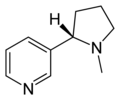Are natural insecticides always safe?
 |
| nicotine (drawing from wikipedia) |
By this definition nicotine is a natural insecticide. Nicotine is produced by plants in the nightshade family of which tobacco is one species. Tobacco farmers have long-known that an infusion of water and tobacco leaves makes a powerful, and highly toxic, insecticide. In fact nicotine was at one time available as a commercial insecticide product called Black Leaf 40. Imidacloprid (Merit) is a modern insecticide based on nicotine chemistry.
Nicotine is a powerful neurotoxin (nerve toxin). At low doses it acts as a stimulant while at higher doses it causes uncontrolled convulsions and respiratory failure.
Pyrethrum also is a natural insecticide. Pyrethrum is a product of certain plants in the genus Chrysantheum. It also is a powerful insecticide but is relatively non-toxic to other animals, including us. It is still widely used in products intended for homeowner use.
The point of the above is that calling something "natural" should not automatically imply it is safe. There are many natural compounds like nicotine that are highly toxic and you would not want to apply them around your home.
Insecticides are generally classified as organic (a product of a living organism), inorganic (usually mineral based like borate insecticides), or synthetic (manufactured). Organic insecticides can be further classified as plant-based or microbial. See this article for details about the different pesticide types.
Choose insecticides based on their toxicity and environmental persistence not on whether or not someone calls them "natural"; after all rattlesnake venom is natural, too!



Comments